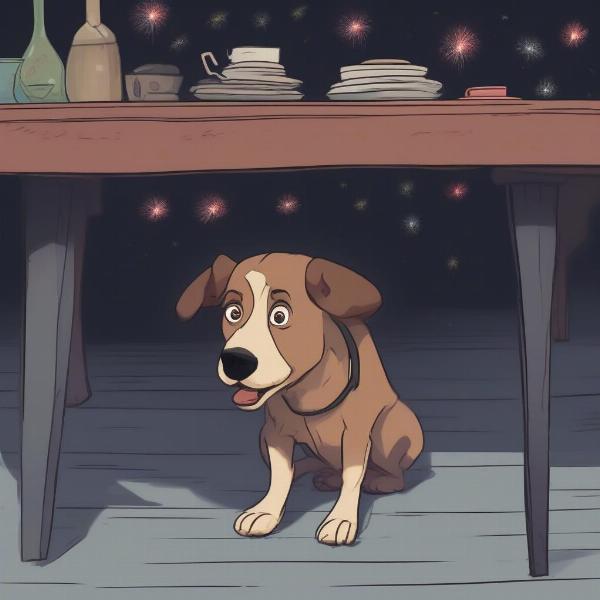A panting dog at night can be a worrying sight for any owner. While some panting is normal, excessive or sudden panting can indicate an underlying issue. This article will delve into the common causes of panting in dogs at night, explain when to be concerned, and offer practical tips to help soothe your furry friend. We’ll explore everything from environmental factors to serious health conditions, giving you the knowledge to ensure your dog’s comfort and well-being.
Understanding Why Dogs Pant
Dogs pant to regulate their body temperature. Unlike humans who sweat, dogs primarily cool down through evaporation from their tongues and respiratory tract. Panting increases airflow over these moist surfaces, helping them dissipate heat. While panting is a natural process, it’s important to recognize when it becomes excessive or unusual, especially at night.
Common Reasons for Panting Dog at Night
There are several reasons why your dog might be panting more at night. Some are benign, while others require veterinary attention.
Environmental Factors
- Heat: A warm room or a thick blanket can easily overheat a dog, leading to panting. Ensure your dog’s sleeping area is cool and well-ventilated.
- Stress and Anxiety: Nighttime can be a stressful time for some dogs, especially if they are alone or experience separation anxiety. Changes in routine, loud noises, or unfamiliar environments can also trigger anxiety and panting.
Medical Conditions
- Pain: If your dog is experiencing pain from an injury, arthritis, or other medical condition, they may pant more at night. This panting may be accompanied by other signs of discomfort, such as restlessness, whining, or changes in appetite.
- Respiratory Issues: Conditions like asthma, pneumonia, or heart problems can make it difficult for a dog to breathe, leading to increased panting.
- Cushing’s Disease: This hormonal disorder can cause a range of symptoms, including increased panting, thirst, and urination.
- Obesity: Overweight dogs are more prone to overheating and therefore may pant more, particularly at night.
When to Worry About Your Panting Dog
While occasional panting is normal, you should consult a veterinarian if your dog’s panting:
- Is sudden or severe
- Is accompanied by other symptoms, such as coughing, vomiting, or lethargy
- Persists for an extended period
- Seems out of character for your dog
 Dog panting at night due to anxiety
Dog panting at night due to anxiety
Comforting a Panting Dog at Night
If you’re concerned about your dog’s panting, there are several things you can do to help:
- Ensure a Cool Environment: Provide a comfortable sleeping area with good ventilation. Consider a cooling mat or fan.
- Offer Fresh Water: Make sure your dog has access to cool, fresh water at all times.
- Create a Calm Atmosphere: Minimize noise and distractions. A calming pheromone diffuser or white noise machine can help create a relaxing environment.
- Provide Comfort and Reassurance: If your dog is anxious, spend some time with them, offering gentle petting and reassurance.
Conclusion
A panting dog at night can be a sign of various factors, ranging from simple overheating to more serious medical conditions. By understanding the potential causes and observing your dog closely, you can determine the best course of action. Always consult a veterinarian if you’re concerned about your dog’s health or if the panting is excessive or accompanied by other symptoms. Providing a cool, comfortable, and calming environment can go a long way in ensuring your furry friend’s well-being.
FAQ
- Is it normal for a dog to pant slightly at night? Yes, some panting is normal, especially if the environment is warm.
- What are the signs of heatstroke in dogs? Excessive panting, drooling, weakness, vomiting, and collapse are signs of heatstroke.
- Can anxiety cause a dog to pant? Yes, anxiety is a common cause of panting in dogs.
- Should I give my dog medication for panting? Never give your dog medication without consulting a veterinarian.
- How can I tell if my dog is in pain? Panting, restlessness, whining, changes in appetite, and limping can be signs of pain.
- When should I take my panting dog to the vet? If the panting is severe, sudden, persistent, or accompanied by other symptoms, consult a veterinarian immediately.
- How can I create a calming environment for my dog at night? Minimize noise, provide a comfortable bed, and consider using a pheromone diffuser or white noise machine.
Related Articles on ILM Dog
- dog pacing and panting at night
- excessive panting in dogs at night
- old dog panting at night
- older dog panting at night
About ILM Dog
ILM Dog is your trusted international resource for expert dog care advice. We offer comprehensive information on dog breeds, health, training, nutrition, grooming, and much more to help you provide the best possible care for your canine companion. From puppyhood to senior years, we cover every aspect of dog ownership, offering practical tips and guidance from experienced professionals. For expert advice on dog health, nutrition, or any other dog-related query, contact us at [email protected] or call us at +44 20-3965-8624.